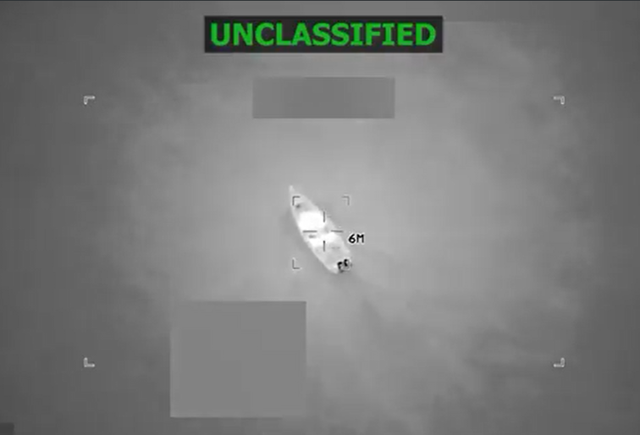New U.S. strike on alleged drug-smuggling boat kills 6 on board, Hegseth says
Washington — Defense Secretary Pete Hegseth said Friday that the U.S. carried out another strike on a vessel allegedly operated by the Venezuelan gang Tren de Aragua that he said was trafficking drugs in the Caribbean Sea.
Hegseth said on X that the strike killed all six men who were on board, and took place in international waters. He said it is the first strike to take place at night.
"The vessel was known by our intelligence to be involved in illicit narcotics smuggling, was transiting along a known narco-trafficking route, and carrying narcotics," he wrote. Hegseth's post included an unclassified video showing the vessel as it was hit.
This latest strike appears to be the 10th carried out by the Trump administration against alleged drug trafficking boats over the past several weeks, which have now led to at least 43 deaths. The first several took place in the Caribbean Sea, but this week, the administration's campaign broadened into the Pacific Ocean.
Two men, one from Ecuador and the other from Colombia, survived a U.S. strike on a suspected drug-trafficking submersible vessel in the Caribbean Sea last week and were repatriated. The Ecuadorian man was released after the authorities there found no evidence he committed a crime, Ecuador's attorney general's office said. The Colombian citizen was hospitalized, and authorities there said he would be prosecuted.
Hegseth announced two other strikes that took place Tuesday and Wednesday, both of which he said occurred in the Eastern Pacific. In his social media posts, the Defense secretary has alleged that the vessels were operated by a "designated terrorist organization," but did not name the group.
The Pentagon announced later Friday that the U.S. is sending an aircraft carrier strike group to the region, dramatically increasing the resources available in the anti-trafficking campaign. The USS Gerald Ford will join eight other vessels already in U.S. Southern Command's area of responsibility.
The Colombian government urged the U.S. earlier this week to stop attacking boats in the Pacific and Caribbean Sea and "respect the norms dictated by international law." In an interview Thursday with CBS News national correspondent Lilia Luciano, Colombian President Gustavo Petro said he believes that the White House needs to focus on the leaders of drug cartels, not suspected lower-level traffickers.
"Killing the workers of the business is easy, but if you want efficiency, you have to capture the bosses of the business," Petro told CBS News.
President Trump has attacked Petro as an "illegal drug leader" who has a "fresh mouth toward America," and threatened that if he didn't "close up these killing fields immediately," then "United States will close them up for him, and it won't be done nicely."
The administration told Congress earlier this month that the U.S. is in a "non-international armed conflict" with drug cartels and argued that the narcotics they bring into the country illegally is killing tens of thousands of Americans annually, which it said constitutes an "armed attack."
While Hegseth has claimed that the targeted vessels are moving along a "known narco-trafficking route," Sen. Mark Kelly, a Democrat from Arizona, told "Face the National with Margaret Brennan" that the routes through the Caribbean are predominantly used to traffick cocaine to Europe, not the U.S.
The senator also said that when the administration briefed Congress on the strikes, they "had a very hard time explaining to us the rationale, the legal rationale for doing this and the constitutionality of doing it."
The Trump administration's strikes have frustrated lawmakers on both sides of the aisle, who have argued it needs congressional authorization to engage in hostilities with the drug cartels. Members of Congress have also said the administration hasn't provided sufficient evidence that the targeted vessels are carrying drugs and have questioned the legality of the strikes.
Sen. Mark Warner of Virginia and Rep. Jim Himes of Connecticut, the top Democrats on the Senate and House Intelligence Committees, respectively, sent a letter to Director of National Intelligence Tulsi Gabbard on Friday seeking information about the intelligence community's role in the operations and whether there has been any analysis conducted as to their legality.
"To be clear — we are acutely aware of the tens of thousands of American lives lost every year to illicit drugs and we agree that these dangerous criminal cartels should be held to account," they wrote. "However, in order for us to conduct our basic, constitutionally required oversight of the IC there are fundamental questions that require answers, to include the factual basis for and effects of the strikes. Most importantly, good intelligence is critical to ensure that these operations do not kill innocent people with no connection to the drug trade."
Mr. Trump told reporters at the White House on Thursday that his administration would continue to provide information to Congress on the strikes, but wouldn't seek a declaration of war.
"I think we're just going to kill people that are bringing drugs into our country. Okay? We're going to kill them. You know? They're going to be like, dead," he said.
The president also suggested that there could be land strikes next, and may inform Congress about such a step.
"The drugs coming in by sea are like 5% of what they were a year ago, less than 5%. So now they're coming in by land," Mr. Trump said. "And even the land is a concern, because I told them, that's going to be next. You know, the land is going to be next. And we may go to the Senate, we may go to the Congress and tell them about it. But I can't imagine they'd have any problem with it."
